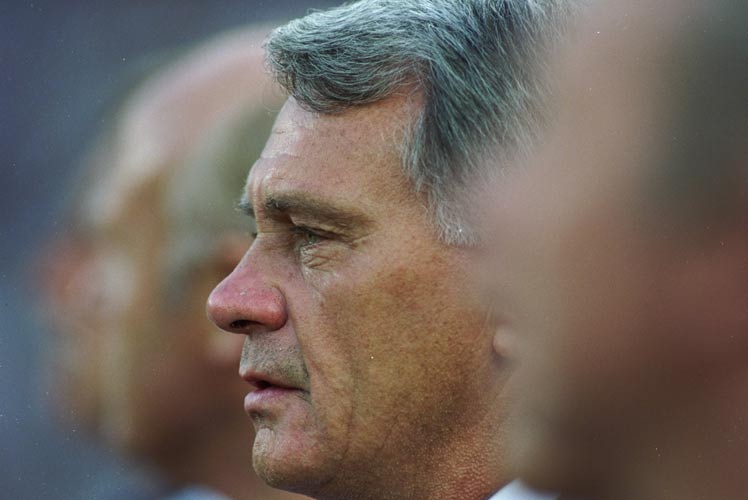Sir Bobby - knight, gentleman and visionary

Your support helps us to tell the story
This election is still a dead heat, according to most polls. In a fight with such wafer-thin margins, we need reporters on the ground talking to the people Trump and Harris are courting. Your support allows us to keep sending journalists to the story.
The Independent is trusted by 27 million Americans from across the entire political spectrum every month. Unlike many other quality news outlets, we choose not to lock you out of our reporting and analysis with paywalls. But quality journalism must still be paid for.
Help us keep bring these critical stories to light. Your support makes all the difference.
When Sir Bobby Robson spoke, invariably there was passion in his voice, a twinkle in his eye and laughter rarely far away.
He was known to refer to former Newcastle midfielder Lauren Robert as "Lauren Bacall".
When asked once what he would have done if he hadn't been a footballer, he famously replied: "I would have given my right arm to be a pianist."
Like any pensioner, as traversed his 70s, occasionally he lost the thread of his argument when rambling between subjects.
But, I'll tell you what, no football man deserved his knighthood more. No manager better balanced the need for hard decision-making with the caring touch.
If it hadn't been for Maradona's 'Hand of God' back in the World Cup quarter-final of 1986, who is to say Robson would not have gone on to have become the second England manager to lift the trophy?
If it hadn't been for the wayward radar of Stuart Pearce and Chris Waddle in the semi-final penalty shoot-out against the Germans, Robson would surely have delivered the World Cup for his country in 1990.
So near, yet so far from football's greatest prize on two occasions.
Yet, as 76-year-old Robson finally succumbed to the cancer he had fought so bravely in its various guises for so long, it would be wrong to view his career with the slightest taint of failure despite the manic vitriol he suffered at the hands of certain parts of the media during his England reign.
As a cultured right-half with Fulham, West Brom and England he might not have possessed the excellence which earned Stanley Matthews, Bobby Charlton and Tom Finney the same status as Knights of the Realm.
As a manager, he did not scale the heights of Sir Alf Ramsey, nor garner silverware as prolifically as Sir Matt Busby or Sir Alex Ferguson.
But, along with Brian Clough and Bob Paisley, there can be no doubt that he stands out as one of the greatest managers in British football history.
Apart from his first two posts at Vancouver Whitecaps and Fulham, Robson excelled wherever he went.
In 13 years with Ipswich, he brought unprecedented glory to East Anglia, winning the FA Cup in 1978 against Arsenal with Roger Osborne's solitary goal.
He followed that up with the UEFA Cup in 1981 and was instrumental in throwing open the gates to European players when he signed Dutch stars Frans Thyssen and Arnold Muhren.
He was one of soccer's visionaries and that, as much as his high profile with the national side, attracted the attentions of top continental clubs.
He won the Dutch league in consecutive seasons with PSV Eindhoven, did the same with Porto and presided over Barcelona's Cup Winners Cup campaign in 1996 before moving upstairs as a players' scout.
To get him talking about Brazilian Ronaldo, whom he signed at PSV, was to wave goodbye to an entire afternoon.
That, in a footballing world when so many so-called superstars are imposters, was the beauty of Sir Bobby. What you see and hear is what you get.
No armchairs and boardrooms for Robson.
Robson loved the smell of liniment, thrived on pitting wits against adversaries on the training ground and in the pressure of match day where others might have frozen.
For all his wandering monologues, and there was a time when the England dressing room affectionately dubbed him 'Mogadon', Robson reduced football to a refreshing simplicity.
In Robson's world, a manager always picked his best 11 players, briefed them on how best to beat the opposition, sent them out with a Churchillian address and told them not to come back until they had given their all.
The force of his personality did wonders for Newcastle when he arrived in September 1999 following the failed stewardship of Ruud Gullit.
Robson took the Geordies to fourth in the Premier League to earn a place in the Champions League.
He also prolonged the career of Alan Shearer, whose goals had dried up and whose relationship with Gullit had been strained.
Robson swiftly identified a technical problem in Shearer's positioning which was allowing defenders to nullify his ability to hold up the ball.
It was such depth of footballing knowledge which immediately won the players' respect, even if in the end he was sacked just a handful of games into a new season and had to fight for his contract to be honoured.
Even then he would not let such disgraceful treatment affect his love for the game, prolonging his footballing career by assisting Republic of Ireland manager Steve Staunton.
Football folk loved him for that energy and enthusiasm. And for his eccentricity.
Such as during Italia 90 when he was mulling over his next selection as he descended in the lift at the team hotel.
As the lift doors opened, there waiting was his captain Bryan Robson.
"Hi Bobby," said Bobby absent-mindedly.
"No, I'm Bryan, you're Bobby," replied Bryan.
It's a lovely story.
In truth, however, there could only ever be one Sir Bobby Robson.
Join our commenting forum
Join thought-provoking conversations, follow other Independent readers and see their replies
Comments